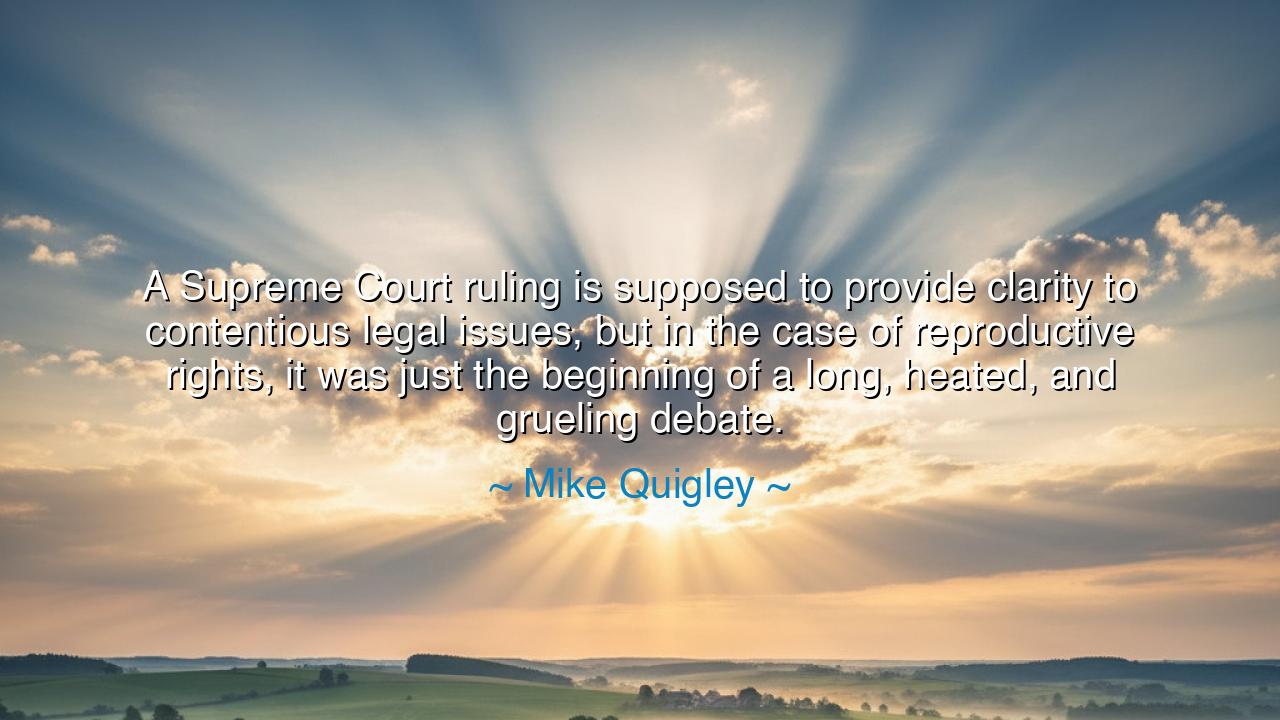
A Supreme Court ruling is supposed to provide clarity to
A Supreme Court ruling is supposed to provide clarity to contentious legal issues, but in the case of reproductive rights, it was just the beginning of a long, heated, and grueling debate.






The words of Mike Quigley echo through the chambers of history like a solemn bell — “A Supreme Court ruling is supposed to provide clarity to contentious legal issues, but in the case of reproductive rights, it was just the beginning of a long, heated, and grueling debate.” In this single reflection lies a profound truth about the human condition and the eternal struggle between law, morality, and the tides of conscience. For though the Supreme Court stands as the highest arbiter of justice, there are matters that no decree, however wise or final, can settle — matters that belong not merely to the realm of law, but to the beating heart of humanity itself.
In the ancient world, rulers believed that once a law was written in stone, peace would follow. Yet time proved them wrong. The laws of men may command obedience, but they cannot command agreement. Where conviction and conscience diverge, the battlefield is not of armies, but of souls. The issue of reproductive rights, which Quigley names, is one such battlefield — a place where moral conviction, personal freedom, and religious belief meet in fierce collision. Here, even a ruling from the highest court becomes but a spark to the dry grass of public passion.
When the Supreme Court decided Roe v. Wade in 1973, many thought the matter resolved. Yet rather than quenching the fire, it fanned the flames. Across America, a great moral tempest arose — protests, prayers, and political wars that would last generations. The decision was meant to provide clarity, but instead it exposed the deep rift in the nation’s heart. For the Court can interpret the Constitution, but it cannot dictate conscience. It can define legality, but not morality. And where these two rivers diverge, the human spirit wrestles with itself.
This struggle is not new. The ancients, too, faced questions the law could not settle. In Antigone, Sophocles wrote of a woman who defied the king’s edict to honor the higher law of the gods. Her defiance revealed a truth that endures: when human laws conflict with the soul’s sense of justice, debate becomes destiny. So too in modern times, the question of life, choice, and moral duty continues to rend hearts and homes. It is not the Court alone that must speak — it is the people, in their dialogue, compassion, and courage, who must seek balance.
Quigley’s observation teaches that rulings do not end debates; they begin them. The written judgment is the seed, but the harvest is born in the hearts of citizens, advocates, and generations to come. The grueling debate he speaks of is not a failure of justice — it is a testament to freedom itself. For only in a free society can such fierce questioning exist, where individuals may stand face to face with their government and say, “We will wrestle with this truth until it becomes clear to all.”
From this, let us draw a lesson worthy of remembrance: law can guide, but only empathy can heal. To navigate the storms of moral conflict, one must listen — not to win, but to understand. It is through patience, dialogue, and humility that nations evolve. When the Court speaks, let it not be the end of discussion, but the beginning of reflection. Let every ruling be a mirror held up to society, that we may see ourselves not only as governed, but as growing.
So, my child of the future, remember this: the pursuit of justice is not a single act, but a lifelong conversation. When you face issues that divide your people — whether of faith, freedom, or life itself — do not rush to silence your opponent. Instead, listen with courage, speak with grace, and act with compassion. For in that sacred balance between conviction and understanding lies the true clarity the law seeks but cannot always bestow — the clarity born not from authority, but from the awakening of the human soul.






AAdministratorAdministrator
Welcome, honored guests. Please leave a comment, we will respond soon